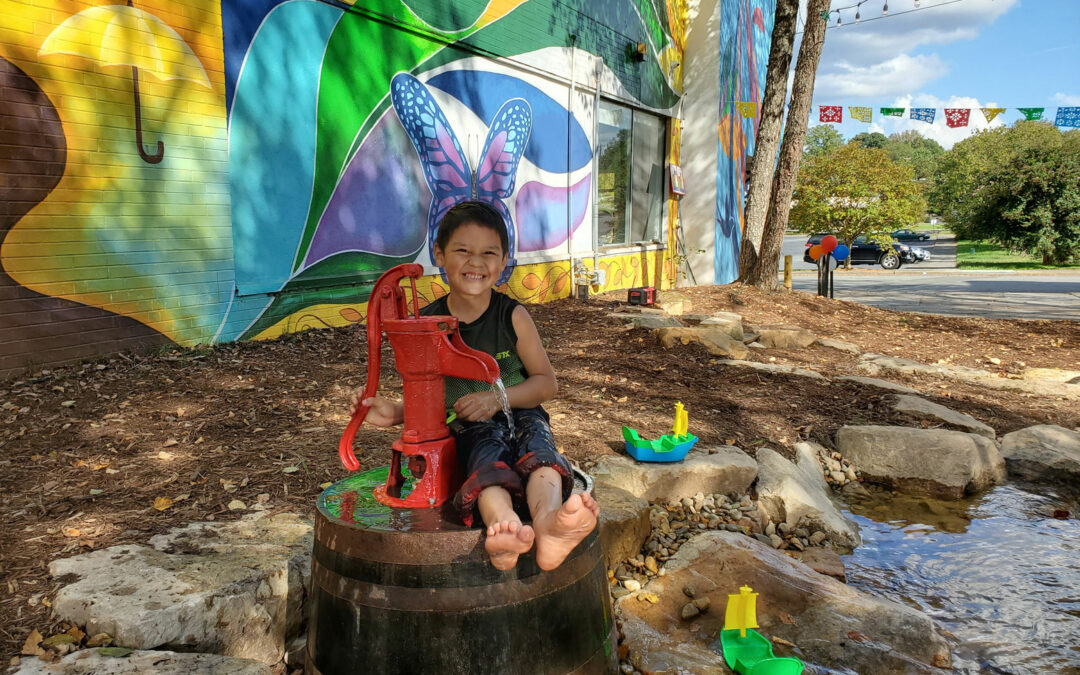Mental health stigma refers to the unfavorable attitudes and beliefs around mental health, often formed by a lack of knowledge that may make people reluctant to get treatment. Studies show disparities between the Latino community accessing mental health resources compared to other ethnicities. According to the National Alliance on Mental Illness, “more than half of Hispanic young adults ages 18-25 with serious mental illness may not receive treatment, and only 35.1% of Hispanic/Latino adults with mental illness receive treatment each year compared to the U.S. average of 46.2%.” At El Futuro, we have broken down barriers to care in the Latino community by providing culturally effective treatments. Breaking down the mental health stigma in the Latino community may help increase the number of people receiving treatment and improve their mental health condition instead of worsening it. Using evidence-based interventions, such as education and culturally sensitive practices, with culturally competent mental health providers who deliver culturally sensitive interventions can assist in overcoming these barriers. (Ahad et al., 2023).
At El Futuro, we have mental health providers who are not only Spanish-speaking, but many are of the same Latino culture. Having culturally competent providers familiar with culture-bound illnesses can help increase rapport and client outcomes. Examples of culture-bound mental health conditions for the Latine community include ‘nervios, ataque de nervios, susto, coraje, and fatalismo.’ Nervios is similar to depression, ataque de nervios is similar to a panic attack, susto to shock, coraje to anger, and fatalismo is fatalism. Moreira et al. (2018) explain the following:
Susto (fright) is defined as a condition of intense emotion felt after experiencing a traumatic event, such as a car accident or the death of a child, that—according to tradition—makes the soul leave the body.” Acknowledging these terms and the client’s explanation of their symptoms, including their cultural way of healing them, may increase their willingness to participate in the mental health resources and treatment offered. Using the terms they may be familiar with can also reduce the mental health stigma or fear of being considered ‘crazy.’
Along with culturally competent care, education has also proven to help overcome mental health stigma. Education regarding the nature of mental health disorders and their symptoms may increase the willingness to seek and receive treatment. By educating the public about “baby blues,” the mental health stigma against postpartum depression has been diminished. An increasing number of mothers are willing to receive treatment in cognitive behavior therapy and medication for the baby blues because this is now more accepted and less taboo than other mental health conditions such as schizophrenia. By reducing the stigma against schizophrenia and other mental health conditions, perhaps more individuals would seek treatment. In the Latino community, education regarding medication can reduce the common concerns of dependency, addiction, and overmedication and increase confidence and treatment adherence.
At El Futuro, we have made a welcoming and culturally appropriate space for Latinos to receive mental health services. Breaking the stigma and receiving mental health services has many benefits, including improved overall health and quality of life. At El Futuro, we acknowledge the client’s beliefs and practices and integrate the mental health practices already established in the Latino culture, such as getting together in our community space para sanar juntos (to heal together).
Hispanic/Latinx. National Alliance on Mental Illness.
Article written by Candy Moreira BSN RN


 Alvely Alcántara, LCSW
Alvely Alcántara, LCSW Rossy C. Garcia, MEd
Rossy C. Garcia, MEd  Katy Sims, MD
Katy Sims, MD  Everardo Aviles, LCSW, LCAS (Eve)
Everardo Aviles, LCSW, LCAS (Eve) As a medical anthropologist and social work researcher, Dr. Gulbas’ research embodies interdisciplinarity through the integration of applied theories of health and human development with qualitative and ethnographic methodologies. Her work seeks to understand how people—children, families, and providers—navigate complex sociocultural landscapes in the pursuit of mental health. Most of her work, to date, focuses attention on developing more robust interpretations of suicide risk. With funding from the National Institutes of Mental Health, this body of research has contributed to advancements in theoretical and empirical knowledge of the broader contexts within which youth suicide risk is situated.
As a medical anthropologist and social work researcher, Dr. Gulbas’ research embodies interdisciplinarity through the integration of applied theories of health and human development with qualitative and ethnographic methodologies. Her work seeks to understand how people—children, families, and providers—navigate complex sociocultural landscapes in the pursuit of mental health. Most of her work, to date, focuses attention on developing more robust interpretations of suicide risk. With funding from the National Institutes of Mental Health, this body of research has contributed to advancements in theoretical and empirical knowledge of the broader contexts within which youth suicide risk is situated.  R. Gabriela Barajas-Gonzalez is a developmental psychologist and an assistant professor of Population Health at NYU Grossman School of Medicine. Dr. Barajas-Gonzalez is the principal investigator of a study that examines the impact of immigration-related threat and stress on school communities. She earned a PhD in developmental psychology from Columbia University and hold a BA in human biology from Stanford University. Dr. Barajas-Gonzalez is the daughter of Mexican immigrants and a first gen college student.
R. Gabriela Barajas-Gonzalez is a developmental psychologist and an assistant professor of Population Health at NYU Grossman School of Medicine. Dr. Barajas-Gonzalez is the principal investigator of a study that examines the impact of immigration-related threat and stress on school communities. She earned a PhD in developmental psychology from Columbia University and hold a BA in human biology from Stanford University. Dr. Barajas-Gonzalez is the daughter of Mexican immigrants and a first gen college student. Dr. Parra-Cardona is an Associate Professor in the Steve Hicks School of Social Work (SHSSW) at the University of Texas at Austin. At the SHSSW, he serves as Coordinator for Mexico and Latin American initiatives. He also serves as Area Director for Research at the UT Austin Latino Research Institute. Dr. Parra-Cardona’s program of research is focused on the cultural adaptation of evidence-based parenting interventions for low-income Latinx populations in the US and Latin America.
Dr. Parra-Cardona is an Associate Professor in the Steve Hicks School of Social Work (SHSSW) at the University of Texas at Austin. At the SHSSW, he serves as Coordinator for Mexico and Latin American initiatives. He also serves as Area Director for Research at the UT Austin Latino Research Institute. Dr. Parra-Cardona’s program of research is focused on the cultural adaptation of evidence-based parenting interventions for low-income Latinx populations in the US and Latin America. Bianka Reese, PhD, MSPH is a research scientist and program evaluator specializing in adolescent and young adult sexual and reproductive health. Her previous research in the experiences of Latinx LGBTQ+ youth stems from her work as the Research and Evaluation Manager at SHIFT NC (Sexual Initiatives For Teens), where she led largescale evaluations of multilevel, community-based sexual health promotion initiatives and research projects aimed at elevating the voices of diverse youth in North Carolina. Dr. Reese is currently the Senior Research Strategist at Creative Research Solutions, LLC, an award-winning national evaluation, research, and assessment firm.
Bianka Reese, PhD, MSPH is a research scientist and program evaluator specializing in adolescent and young adult sexual and reproductive health. Her previous research in the experiences of Latinx LGBTQ+ youth stems from her work as the Research and Evaluation Manager at SHIFT NC (Sexual Initiatives For Teens), where she led largescale evaluations of multilevel, community-based sexual health promotion initiatives and research projects aimed at elevating the voices of diverse youth in North Carolina. Dr. Reese is currently the Senior Research Strategist at Creative Research Solutions, LLC, an award-winning national evaluation, research, and assessment firm. Tania Connaughton-Espino, MPH is an independent researcher focused on adolescent and young adult sexual and reproductive health. Her interest in the experiences of Latinx LGBTQ+ youth stems from her previous work with SHIFT NC (Sexual Initiatives For Teens), where she led the training and evaluation department, conducted capacity-building workshops for youth serving professionals including on the topic of how to be more affirming of LGBTQ youth, and from her extensive experience working with the Latinx population in NC.
Tania Connaughton-Espino, MPH is an independent researcher focused on adolescent and young adult sexual and reproductive health. Her interest in the experiences of Latinx LGBTQ+ youth stems from her previous work with SHIFT NC (Sexual Initiatives For Teens), where she led the training and evaluation department, conducted capacity-building workshops for youth serving professionals including on the topic of how to be more affirming of LGBTQ youth, and from her extensive experience working with the Latinx population in NC. Maru Gonzalez, EdD is an Assistant Professor and Youth Development Specialist in the Department of Agricultural and Human Sciences at North Carolina State University. Her areas of inquiry include youth development with a focus on activism, social justice, and the experiences of LGBTQ+ young people across familial, school, and community contexts.
Maru Gonzalez, EdD is an Assistant Professor and Youth Development Specialist in the Department of Agricultural and Human Sciences at North Carolina State University. Her areas of inquiry include youth development with a focus on activism, social justice, and the experiences of LGBTQ+ young people across familial, school, and community contexts.  Nayeli Y. Chavez-Dueñas, PhD
Nayeli Y. Chavez-Dueñas, PhD Hector Y. Adames, PsyD
Hector Y. Adames, PsyD